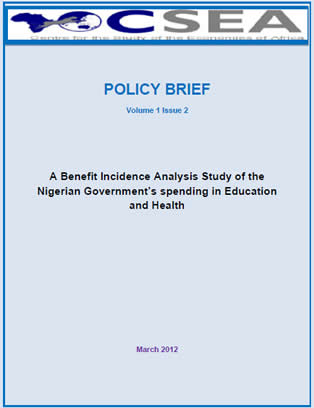Publication Date:November, 2011
Volume Number:1 Issue 3
Document Size:4 pages
This volume presents the results of the Program Budgeting Analysis (PBA), the first analyticalcomponent of the Global Development Networks (GDN) and Results for Development (R4D)project on Strengthening Institutions to Improve Public Expenditure Accountability (SIIPEA).The goal of this analysis is to deepen stakeholders understanding of the sources of fundingand how money is allocated to, and spent in the social sectors of health and education, whichare critical for pro-poor growth and poverty alleviation. The analysis focuses on FederalGovernment spending from 2006 to 2010.
Program Budgeting Analysis (PBA) presents a better and more ground-covering method ofbudget planning that can ensure a more even distribution of public resources to lacking areas.This makes it easier for policymakers to identify failing areas due to poor funding and rectifythe situation. It is an informative tool, particularly for those interested in the legislative,political, and reform dimensions of public sector budgeting. Though Program budgetinganalysis is somewhat technical, it is a way of gaining better knowledge of how governmentsets priorities in order to achieve optimum allocation of scarce resources. With emphasis onspecific program objectives, budget data will become more informative, and more clearly,provide evidence of how resources are allocated to various programs by the government.Inparticular, the PBA helps to express the need for, and guides policymakers/governmentofficials on how to deliver services to the community.
The PBA shows that the present spending in the health sector is low, and to improve thecountrys human capital development, government will need to increase spending in theprimary health care and preventive health sub-sectors. This is also true for the primary andsecondary education sub-sectors. Furthermore, there is the need to ensure commensurateservice delivery for amounts spent in the tertiary education sub-sector.

